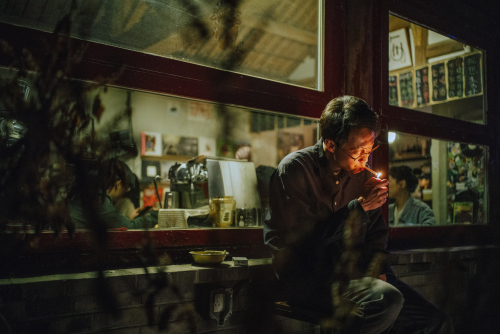
Lu Films
MOVIE REVIEW
The Shadowless Tower (2023)
The White Dagoba is a thousand-year-old temple in Beijing, built on the orders of Kublai Khan, that was, according to this movie named after it, carefully designed and built so as to cast no shadow. In the streets around the temple, whether or not you cast a shadow yourself is not guaranteed. It's quite a striking visual metaphor, but the movie is so overwrought it doesn't quite know how to make the best of it.
Gu Wentong (Xin Baiqing) is a restaurant critic, openly reporting on food trends and interesting places around the city. He is divorced, since when he's lived in his late mother's apartment in the neighborhood near the White Dagoba, shared with a lodger. His daughter Xiaoxiao, a.k.a. Smiley, (Wang Yiwen) is being amicably brought up by his fierce sister, Wenhui (Li Qinqin), and her older husband, Li (Wang Hongwei). On the second anniversary of their mother's death, they visit her grave as a family and are astonished to see someone else has laid flowers. When Wenhui is out of earshot, Li informs Wentong the flowers are from their father (Tian Zhuangzhuang), who has been out of their lives since their childhood. But not out of touch; he's been in secret contact with Li for over two decades; and Li has wearied of keeping this to himself. Wenhui can't find out or she'll divorce him, of course. But Wentong really ought to do something.
What Wentong does do is begin an awkward flirtation with the new photojournalist he's been partnered with, who goes by her surname Ouyang (Huang Yao). She has a tendency to wear cute hats and is dangerously close to being a manic pixie dream girl, but the coincidence of her coming from the same town where the absent father now lives throws them together personally as well as professionally. Ouyang’s interest in Wentong is made quite clear but he is too distracted by the news about his father to be thinking about the hot young colleague throwing herself at him. At least not like that.
The plot then intertwines the story of Wentong and his dad, Wentong and Ouyang, and Ouyang's own lonely life as the Shadowless Tower looms over them all in the background. It's quite a way to externalize how a single mistake can shape multiple lives, but the pacing drags and the subplots (the needy lodger, Smiley being a kid, Ouyang's volunteer work and one dropped in right at the end to really overdo things) pull focus from the main issue: Now that Wentong knows his dad is in the picture, what is he going to do about it? Most of the action takes places in Beijing, where the apartments are minuscule and public places are packed with people happy to involve themselves in the business of strangers. The daily life of ordinary Beijing is rarely shown onscreen like this, which is no doubt what brought the movie to the Berlinale. Writer-director Zhang Lu does a good job of using the city hubbub as a way to magnify Ouyang and Weitong’s alienations, but the scenes in Bedaihe, where Gu’s father flies kites, are shot in a way which makes it impossible to tell if they are real or a dream. It’s frustrating, since Wentong’s midlife identity crisis is interesting enough without the supposition that he’s losing his mind along with it. His hungers – for romantic understanding and personal connection chief among them – have been frustratingly stifled for a long time. What “The Shadowless Tower” does know above all else is leading a horse to water doesn’t make him drink.
Comments